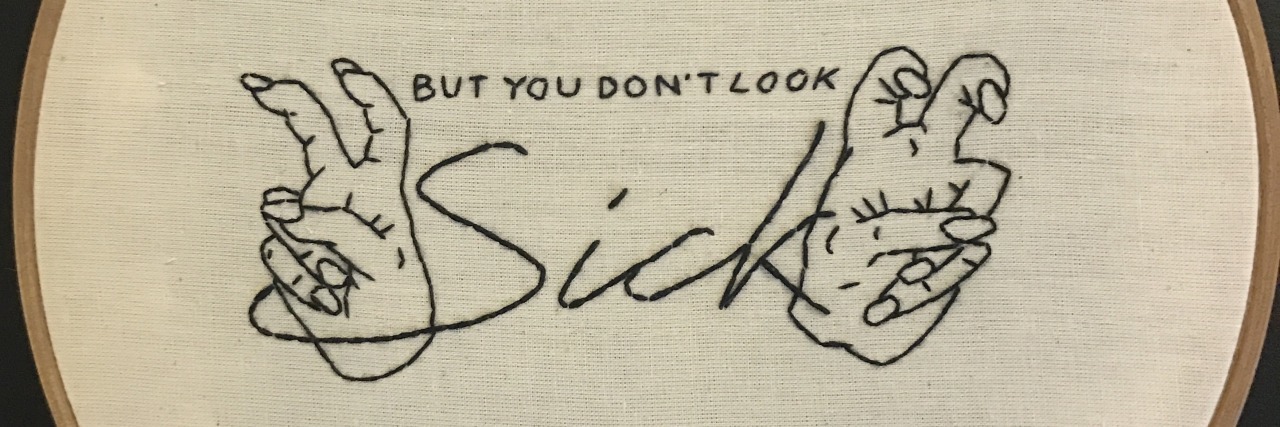When you’re “invisibly ill,” people tend to default to thinking you’re complaining for one of three reasons:
1. You’re looking for attention.
2. You’ve done it to yourself.
3. You’re a hypochondriac who has self-diagnosed with some unheard of illness that you can’t prove.
Each of these assumptions are not only offensive, but really hurtful, especially when they come from people who are supposed to love and care about you.
Time and time again, I’ve had to defend myself against unhelpful comments like:
“But you don’t look sick.”
“Maybe it’s your diet?”
“Perhaps you should try a new sleeping pattern.”
“Get some exercise!”
“Oh, I used to get that sometimes too. Try eating more ‘insert ridiculous health food recommendation here.’”
And the best one, “Maybe don’t go out so much?” – which is ironic because I’ve actually had to start turning down most social events I’m invited to, due to my illness.
I’m 26 years old and I’ve been suffering from worsening symptoms chronic fatigue syndrome (CFS) over the last nine to 12 months, which has now after many inconclusive tests finally been formally diagnosed by a team of National Health Service CFS specialists as “post viral fatigue” (PVF) – for the meantime at least.
If you don’t know much about CFS, you’re probably thinking, “Chronic fatigue? So you’re just really tired all of the time?” Which, this is what I would have thought before this happened to me, but that doesn’t even start to explain it.
I had a pretty bad week when I had that virus where I experienced an intense pain, congestion, and flu-like sort of infection back in February. And since, I’ve suffered from bouts of overwhelming exhaustion, dizziness, memory lapses (brain fog), and a pain I can only describe as a dull ache, crossed with a tingly, almost pins and needles type nerve pain, in my legs and hips. This usually happens when I’ve done too much activity, but I have good and bad days, even “good” weeks if I’m lucky, but I never feel refreshed after a full nights sleep and my pain is almost constant; though I’ve learned on good days to sort of tune it out.
PVF is a hopeful diagnosis as it’s only short term, however if I’m still having problems in 18 months, I’d be classed as having CFS/ME, which is incurable, and there’s no recommended medication to help yet. At the moment I’m getting by seeing an occupational therapist for the emotional issues my illness has caused, but so far I don’t have any help with the pain or physical strain of being exhausted most of the week.
Since I noticeably got ill, I’ve had to change a lot, but whenever I can I try to keep up with seeing family and friends. The problem is, it’s often bittersweet.

I love spending time socializing because for the majority of the week (when I’m not struggling through work), I don’t really see anyone as I’m trying to “save my spoons” so I don’t crash at work. When I have a weekend where I feel OK, I take advantage. It’s great until someone makes a comment that they saw on my social media accounts that I was out at the weekend which “must be why I’m tired.” I’ve even had someone comment that perhaps I shouldn’t broadcast what I do online as people will assume I’m lying when I’m too ill to do something in the following days or weeks.
Are they not a normal person doing the same as me on a weekend, but managing to shake it off by the next day? The thing is, people don’t see that I keep Sundays free every week to ensure I don’t wear myself out for Monday. I even book Mondays as a holiday if I’ve got a particularly busy weekend planned.

People can’t understand invisible illnesses that they’ve never really heard of, and I generally don’t look “ill,” but some days if I’m particularly in pain or shattered, I look very down –because let’s be honest, chronic illnesses really can play on your mental health and has done so for me for some months now.
Sometimes I wish I had any other visible illness that people could sympathize with, which is awful and I shouldn’t wish that on myself… but people’s bad opinions of me are one of the hardest parts of all of this. Why do I have to defend myself? Bodies malfunction, whether physically or mentally, and people are so reluctant to believe something they don’t understand or can’t see.
I’m not a liar, I’m struggling through the hardest thing I’ve ever had to deal with.
Follow this journey on Instagram at @exhaustedme.
We want to hear your story. Become a Mighty contributor here.
Thinkstock Image By: AliSta21

